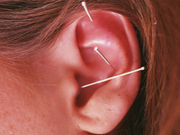Opioid Prescriptions Drop for First Time in Two Decades
Several health data companies report a 12 to 18 percent drop in prescriptions since 2012
Strategies Can Help Streamline Revenue-Related Processes
They can be employed to help maximize amount of time available for patient care
American Psychiatric Association, May 14-18
The 168th American Psychiatric Association Annual Meeting The annual meeting of the American Psychiatric Association was held from May 14 to 18 in...
Sexual Harassment Experienced by One-Third of Female Doctors
And two-thirds say they experience gender bias in workplace
Burnout, Lack of Job Satisfaction Driving Doctors to Cut Hours
Full-time physicians reporting worsening burnout or decreasing job satisfaction more likely to cut hours
Transcranial Direct Current Stimulation Beneficial in BED
Beneficial effects in adults with binge-eating disorder, especially among males
For New Antipsychotic Users, Dose, Duration Impact Mortality
Lower mortality risk for modified standardized daily dose of 1 or less versus greater than 1
Complementary Medicine Use Up With Chronic Conditions
Adults with two or more conditions more likely to use complementary and alternative medicine
Religious Service Attendance May Affect Mortality Among Women
Regular service attendees were one-third less likely to die over 20-year period
Whole-Body Hyperthermia May Help Ease Depression Symptoms
60 percent of patients responded to treatment, 40 percent met the criteria for remission



















